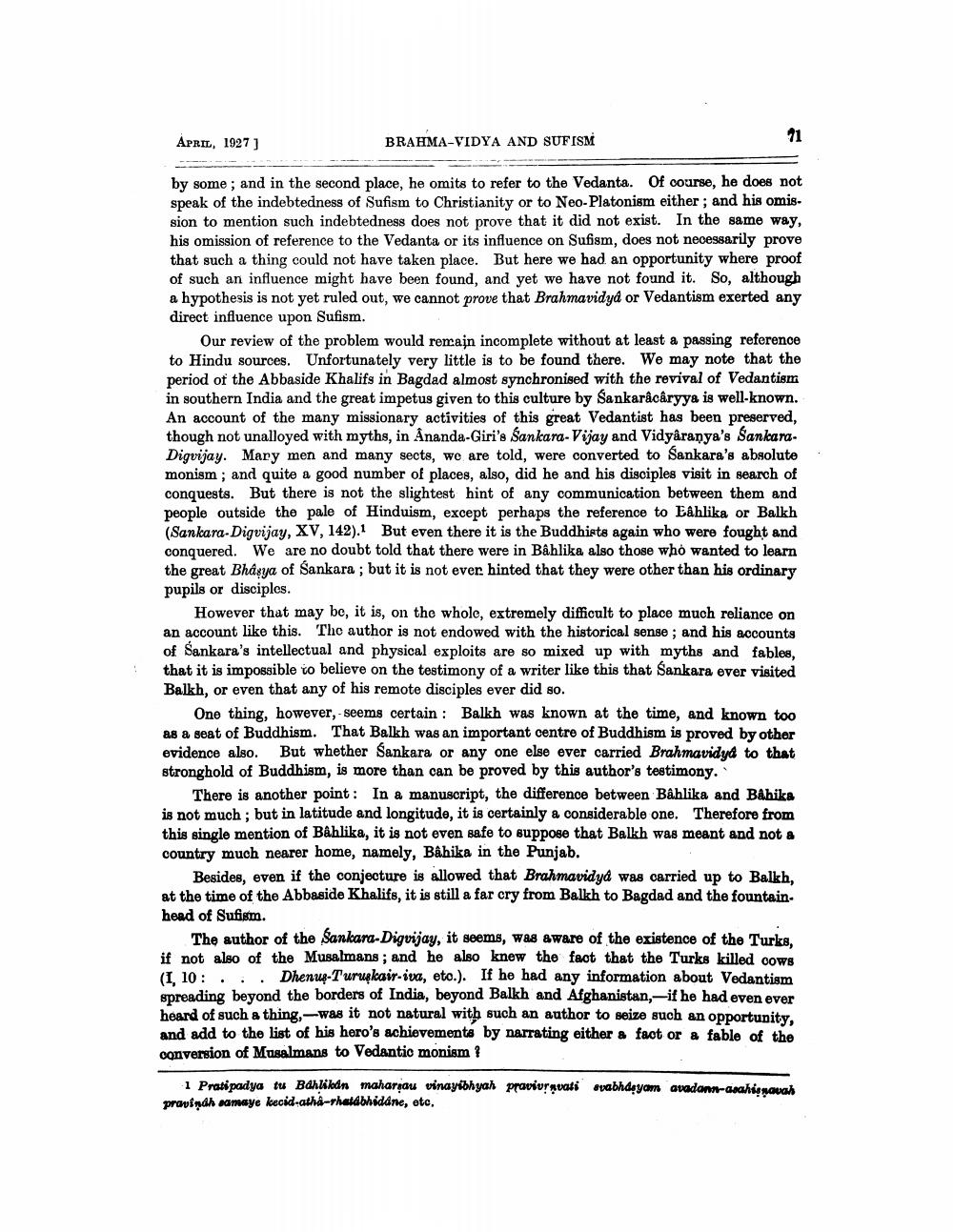________________
APRIL, 1927]
BRAHMA-VIDYA AND SUFISM
71
by some; and in the second place, he omits to refer to the Vedanta. Of course, he does not speak of the indebtedness of Sufism to Christianity or to Neo-Platonism either; and his omission to mention such indebtedness does not prove that it did not exist. In the same way, his omission of reference to the Vedanta or its influence on Sufism, does not necessarily prove that such a thing could not have taken place. But here we had an opportunity where proof of such an influence might have been found, and yet we have not found it. So, although a hypothesis is not yet ruled out, we cannot prove that Brahmavidyd or Vedantism exerted any direct influence upon Sufism.
Our review of the problem would remain incomplete without at least a passing reference to Hindu sources. Unfortunately very little is to be found there. We may note that the period of the Abbaside Khalifs in Bagdad almost synchronised with the revival of Vedantism in southern India and the great impetus given to this culture by Sankarâcâryya is well-known. An account of the many missionary activities of this great Vedantist has been preserved, though not unalloyed with myths, in Ânanda-Giri's Sankara-Vijay and Vidyaranya's SankaraDigvijay. Mary men and many sects, we are told, were converted to Sankara's absolute monism; and quite a good number of places, also, did he and his disciples visit in search of conquests. But there is not the slightest hint of any communication between them and people outside the pale of Hinduism, except perhaps the reference to Eâhlika or Balkh (Sankara-Digvijay, XV, 142).1 But even there it is the Buddhists again who were fought and conquered. We are no doubt told that there were in Bâhlika also those who wanted to learn the great Bhasya of Sankara; but it is not ever hinted that they were other than his ordinary pupils or disciples.
However that may be, it is, on the whole, extremely difficult to place much reliance on an account like this. The author is not endowed with the historical sense; and his accounts of Sankara's intellectual and physical exploits are so mixed up with myths and fables, that it is impossible to believe on the testimony of a writer like this that Sankara ever visited Balkh, or even that any of his remote disciples ever did so.
One thing, however, seems certain: Balkh was known at the time, and known too as a seat of Buddhism. That Balkh was an important centre of Buddhism is proved by other evidence also. But whether Sankara or any one else ever carried Brahmavidyd to that stronghold of Buddhism, is more than can be proved by this author's testimony.
There is another point: In a manuscript, the difference between Bâhlika and Bâhika is not much; but in latitude and longitude, it is certainly a considerable one. Therefore from this single mention of Bâhlika, it is not even safe to suppose that Balkh was meant and not a country much nearer home, namely, Bâhika in the Punjab.
Besides, even if the conjecture is allowed that Brahmavidyd was carried up to Balkh, at the time of the Abbaside Khalifs, it is still a far cry from Balkh to Bagdad and the fountain. head of Sufism.
The author of the Sankara-Digvijay, it seems, was aware of the existence of the Turks, if not also of the Musalmans; and he also knew the fact that the Turks killed cows (1, 10. Dhenus-Turuskair-iva, etc.). If he had any information about Vedantism spreading beyond the borders of India, beyond Balkh and Afghanistan,-if he had even ever heard of such a thing,-was it not natural with such an author to seize such an opportunity, and add to the list of his hero's achievements by narrating either a fact or a fable of the conversion of Musalmans to Vedantic monism?
1 Pratipadya tu Bahlikan mahargau vinayibhyah pravivṛṛvati svabhdayam avadann-asahisavah pravindh samaye kecid-atha-rhatábhidáne, etc.




